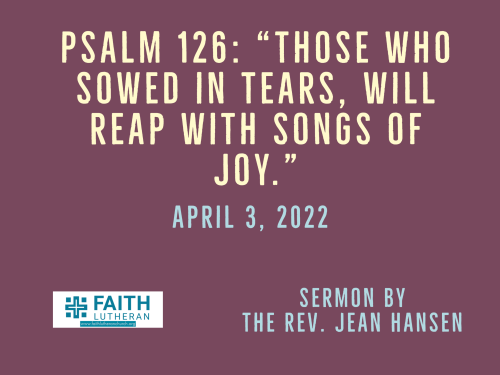
“Those who Sowed in Tears, will Reap with Songs of Joy.”
Apr 03, 2022
Sermon 4-3-22
Fifth Sunday in Lent
Psalm 126
Pastor Jean M. Hansen
It is week #5 of the Psalms, and of Lent. Holy Week begins next Sunday, Palm Sunday. As is usually the case, these days have flown by, and even after our weeks of focus, the Psalms may be set aside for another time. I have a feeling that a lot of that has gone on over the years, and yet these ancient words are not lost, and when they are revisited, the enduring nature of their message is revealed again.
Back in 1985, a book bound in wood and leather was found in a child’s grave south of Cairo, Egypt. At the time it was the oldest complete copy of the Book of Psalms, and perhaps the world’s oldest book. It was hand-written in Coptic and dated from the year 400 BCE. While earlier manuscripts have been found, including an incomplete copy of the Book of Psalms in Hebrew among the Dead Sea scrolls dating from the first century, the Book of Psalms found in Egypt was the oldest actual book. (1)
And we are still reading the psalms today and hearing messages that apply to us. Take today’s Psalm 126, one of the Songs of Ascent, which pilgrims would have sung as they made their way to the Holy City and the Temple. It does have a particular historical context, or so it is thought.
In the opening three verses, the ancient people of God are recalling their deliverance from the captivity of 70 long years in Babylon. Their situation seemed hopeless, so when the Lord brought back the captive to Zion (Jerusalem), they could not believe it. They were “like those who dream. (vs. 1)”
Who would have thought that the Persians would defeat the Babylonians who had taken Israel captive and that the king of Persia would set the captives free? That’s why their mouths are filled with laughter and their tongues with shouts of joy. Even other nations could see the magnitude of this Divine act and proclaim, “the Lord has done great things for them!” They were glad, indeed.
But that’s not the whole story. Even as they gave thanks, they prayed with concern. Look at verse four, “Restore our fortunes, O Lord, like the watercourses of the Negeb.” Only a small band of captives returned, and their homeland was like a desert. They had no homes. Their fields and vineyards, having not been cultivated for years, had gone wild. The city of Jerusalem was in ruins and the Temple had been destroyed. They needed a miracle, as would be the case if the desert region of the Negeb was transformed into fertile land by rainfall. (2)
There is reason to be thankful, but there are also are challenges to face. We know that feeling, don’t we, of being in-between? It’s true to life. As commentator J. Clinton McCann wrote, “Psalm 126 can be a powerful reminder that the people of God have always lived, and will always live, by both memory and hope. We simultaneously celebrate with joy “that the Lord has done great this for us”, and we fervently pray, “Restore our fortunes, O Lord.” (3)
For example, we are thankful that the rigors of the Pandemic are mostly behind us and for the ways God guided us to step out in faith to embrace technology, particularly in worship, but we also must face a “new normal” brought about by two years of detached engagement. Or a person may be grateful that his or her broken leg is well enough to leave the care facility, but there is still a lot of pain and rehab ahead before he or she can dance again. Or there may be rejoicing over a new job that offers good pay and benefits, but then the reality of the job expectations set in and that’s overwhelming. Being able to move into a new home in a new town can be exciting and a reason to celebrate, but then again there’s a mortgage to pay, and renovations to be accomplished and the challenges of making new friends. Celebrating birthday #90 is great, but the saying “growing old is not for sissies” always hovers near-by.
I would guess that everyone here could name an in-between situation that merits both rejoicing and prayers for help. What is yours’? For all of us, as Lent draws to a close, we look forward to celebrating Easter, but must face the rigors of Holy Week first.
Psalm 126 reminds us to remember the great things that God has done in the past and to rely on God to restore our fortunes in the future. Even if there is sadness and worry now (those who sowed with tears), the day will come for happiness and contentment (will reap with songs of joy). If that does not seem to be true in this life (although it often actually is), then it certainly will be true in eternity.
The closing verses of today’s reading from Philippians fit this in-between theme so well. Having received God’s grace through faith in Jesus, Paul writes of his desire to know his Lord and the power of the resurrection. “Not that I have already obtained this or have already reached the goal; but I press on to make it my own, because Christ Jesus made me his own. Beloved, I do not consider than I made it my own; but this one thing I do: forgetting what lies behind and straining forward to what lies ahead, I press on toward the goal for the prize of the heavenly call of God in Christ Jesus.” (Philippians 3:12-14)
The cross of Jesus is before us as we journey toward it this last week of Lent. May we remember to look back and give thanks, look ahead and trust in the harvest to come and look up at Jesus on the cross, who is that moment fully knew what it means to be in-between. AMEN
For the last time now, I will “bug” you about the Psalm memory verses. Today’s is verse 5 of Psalm 126, “Those who sowed in tears, will reap with songs of joy.” Please say it with me.
I will be looking for someone next week who can recite not only that verse from memory, but the other four as well. That prize is going to be really un-Lent-like!
Today, though, I hope to find one of you who can recite lasts week’s verse from Psalm 32:1, “Happy are they whose transgressions are forgiven, and whose sin is put away.” While we’re at it, let’s review the other three:
The most difficult one from Psalm 91:14: “I will deliver those who cling to me; I will uphold them, because they know my name.”
Psalm 27:14: “Wait for the Lord and be strong. Take heart and wait for the Lord.”
Psalm 63:3: “For your steadfast love is better than life itself; my lips shall give you praise.”
We recite these verses just as thousands who have gone before us have done!
(1)“Grave Yields Psalms: World’s Oldest” by Alan Cowell, New York Times, Dec. 24, 1988, Section 1, pg. 11
(2)“Commentary on Psalm 126” by Stan Mast, March 7, 2016, www.cepreaching.org
(3)“Commentary on Psalm 126” by J. Clinton McCann Jr. www.workingpreacher.org






